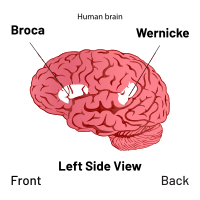Portal:Linguistics
- For a topical guide of this subject, see Outline of linguistics
Welcome to the Linguistics Portal!Linguistics is the scientific study of language. The areas of linguistic analysis are syntax (rules governing the structure of sentences), semantics (meaning), morphology (structure of words), phonetics (speech sounds and equivalent gestures in sign languages), phonology (the abstract sound system of a particular language), and pragmatics (how the context of use contributes to meaning). Subdisciplines such as biolinguistics (the study of the biological variables and evolution of language) and psycholinguistics (the study of psychological factors in human language) bridge many of these divisions. Linguistics encompasses many branches and subfields that span both theoretical and practical applications. Theoretical linguistics (including traditional descriptive linguistics) is concerned with understanding the universal and fundamental nature of language and developing a general theoretical framework for describing it. Applied linguistics seeks to utilize the scientific findings of the study of language for practical purposes, such as developing methods of improving language education and literacy. Linguistic features may be studied through a variety of perspectives: synchronically (by describing the structure of a language at a specific point in time) or diachronically (through the historical development of a language over a period of time), in monolinguals or in multilinguals, among children or among adults, in terms of how it is being learnt or how it was acquired, as abstract objects or as cognitive structures, through written texts or through oral elicitation, and finally through mechanical data collection or practical fieldwork. Linguistics emerged from the field of philology, of which some branches are more qualitative and holistic in approach. Today, philology and linguistics are variably described as related fields, subdisciplines, or separate fields of language study but, by and large, linguistics can be seen as an umbrella term. Linguistics is also related to the philosophy of language, stylistics, rhetoric, semiotics, lexicography, and translation. (Full article...) Selected article - Black American Sign Language is a dialect of American Sign Language (ASL) spoken most commonly by deaf African Americans in the United States. The divergence from ASL was influenced largely by the segregation of schools in the American South. Like other schools at the time, schools for the deaf were segregated based upon race, creating two language communities among deaf signers: White deaf signers at White schools and Black deaf signers at Black schools. Today, BASL is still used by signers in the South despite schools having been legally desegregated since 1954. Linguistically, BASL differs from other varieties of ASL in its phonology, syntax, and lexicon. BASL tends to have a larger signing space meaning that some signs are produced further away from the body than in other dialects. Signers of BASL also tend to prefer two-handed variants of signs while signers of ASL tend to prefer one-handed variants. Some signs are different in BASL as well, with some borrowings from African American English. (more...) Did you know...From Wikipedia's "Did You Know" archives: 
Related PortalsThings you can do
WikiProjectsThe following WikiProjects work to improve topics concerned with linguistics:
Associated WikimediaThe following Wikimedia Foundation sister projects provide more on this subject:
Discover Wikipedia using portals |



























